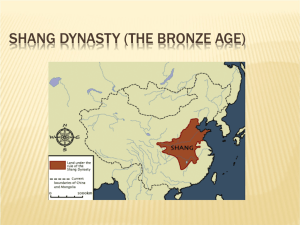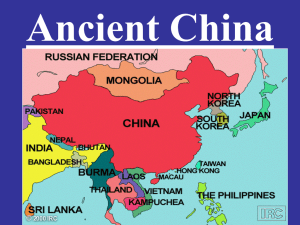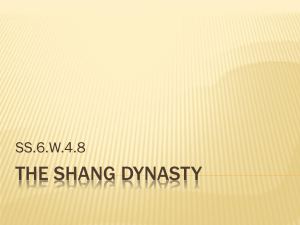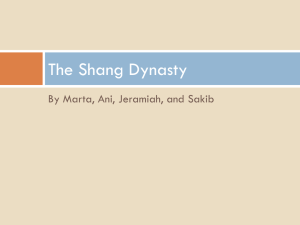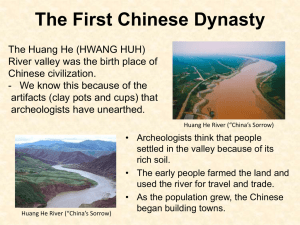Worksheet #______ Name: Date:______ Eastern Civilizations
advertisement
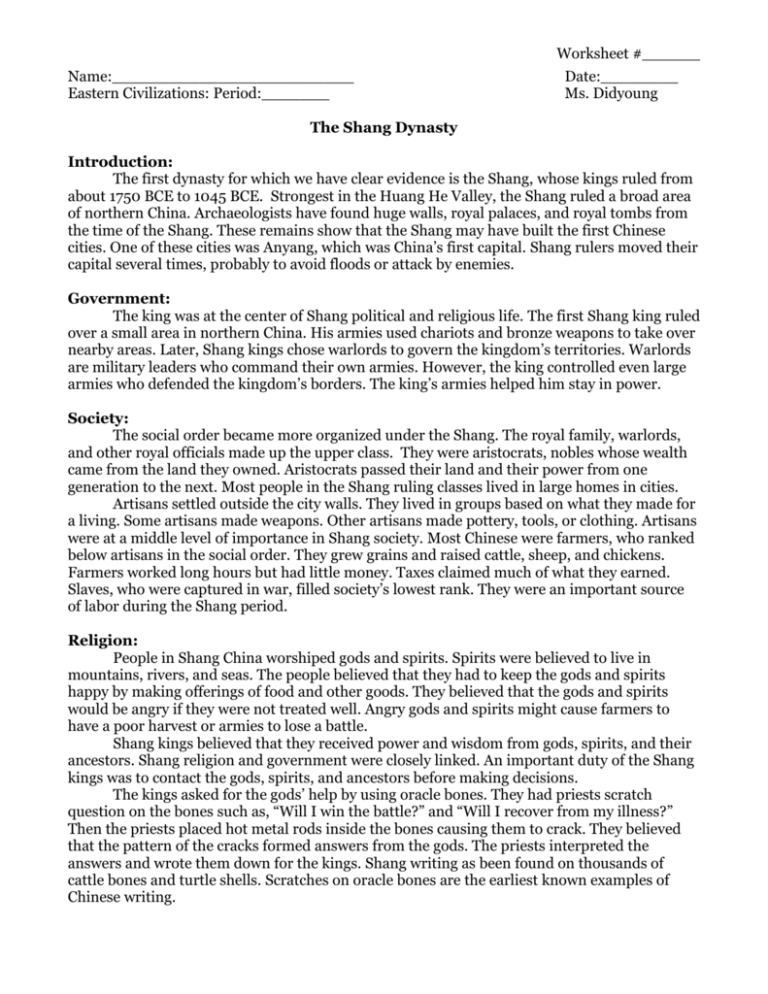
Name:_________________________ Eastern Civilizations: Period:_______ Worksheet #______ Date:________ Ms. Didyoung The Shang Dynasty Introduction: The first dynasty for which we have clear evidence is the Shang, whose kings ruled from about 1750 BCE to 1045 BCE. Strongest in the Huang He Valley, the Shang ruled a broad area of northern China. Archaeologists have found huge walls, royal palaces, and royal tombs from the time of the Shang. These remains show that the Shang may have built the first Chinese cities. One of these cities was Anyang, which was China’s first capital. Shang rulers moved their capital several times, probably to avoid floods or attack by enemies. Government: The king was at the center of Shang political and religious life. The first Shang king ruled over a small area in northern China. His armies used chariots and bronze weapons to take over nearby areas. Later, Shang kings chose warlords to govern the kingdom’s territories. Warlords are military leaders who command their own armies. However, the king controlled even large armies who defended the kingdom’s borders. The king’s armies helped him stay in power. Society: The social order became more organized under the Shang. The royal family, warlords, and other royal officials made up the upper class. They were aristocrats, nobles whose wealth came from the land they owned. Aristocrats passed their land and their power from one generation to the next. Most people in the Shang ruling classes lived in large homes in cities. Artisans settled outside the city walls. They lived in groups based on what they made for a living. Some artisans made weapons. Other artisans made pottery, tools, or clothing. Artisans were at a middle level of importance in Shang society. Most Chinese were farmers, who ranked below artisans in the social order. They grew grains and raised cattle, sheep, and chickens. Farmers worked long hours but had little money. Taxes claimed much of what they earned. Slaves, who were captured in war, filled society’s lowest rank. They were an important source of labor during the Shang period. Religion: People in Shang China worshiped gods and spirits. Spirits were believed to live in mountains, rivers, and seas. The people believed that they had to keep the gods and spirits happy by making offerings of food and other goods. They believed that the gods and spirits would be angry if they were not treated well. Angry gods and spirits might cause farmers to have a poor harvest or armies to lose a battle. Shang kings believed that they received power and wisdom from gods, spirits, and their ancestors. Shang religion and government were closely linked. An important duty of the Shang kings was to contact the gods, spirits, and ancestors before making decisions. The kings asked for the gods’ help by using oracle bones. They had priests scratch question on the bones such as, “Will I win the battle?” and “Will I recover from my illness?” Then the priests placed hot metal rods inside the bones causing them to crack. They believed that the pattern of the cracks formed answers from the gods. The priests interpreted the answers and wrote them down for the kings. Shang writing as been found on thousands of cattle bones and turtle shells. Scratches on oracle bones are the earliest known examples of Chinese writing. Worksheet #______ Achievements: The Shang made many advances including China’s first writing system. This system used more than 2,000 symbols to express words or ideas. Although the system has gone through changes over the years, the Chinese symbols used today are based on the Shang period. Farmers produced silk, which weavers used to make colorful clothes. Artisans made vases and dishes from fine white clay. They also carved statues from ivory and a green stone called jade. The Shang are best known for their works of bronze. Artisans made beautiful bronze containers for cooking and religious ceremonies. They also made axes, knives, and ornaments from jade. The military developed war chariots, powerful bows, and bronze body armor. Shang astrologers also made an important contribution. They developed a calendar based on the cycles of the moon. Fall: During the rule of the Shang, a great gap existed between the rich and the poor. Shang kings lived in luxury and began to treat people cruelly. As a result, they lost the support of the people in their kingdom. In 1045 BC, an aristocrat named Wu Wang led a rebellion against the Shang. After defeating the Shang, Wu began a new dynasty called the Zhou.

